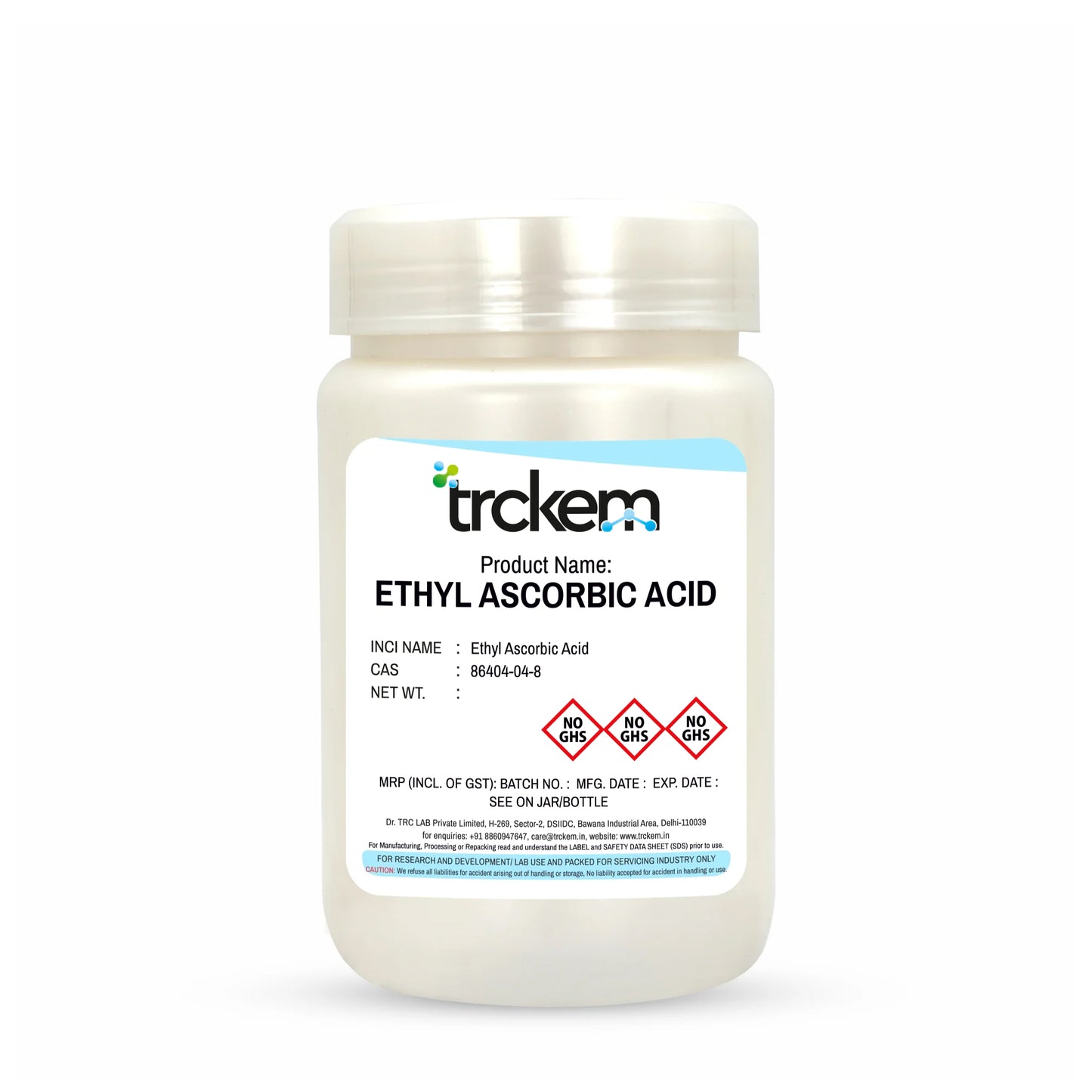

THE STORY OF ETHYL ASCORBIC ACID

Ethyl Ascorbic Acid: The Stable, High-Performance Vitamin C for Radiant Skin
Ethyl Ascorbic Acid is a next-generation, highly stable derivative of Vitamin C. It offers strong brightening, antioxidant, and collagen-boosting benefits while being far more stable than traditional L-ascorbic acid. Widely used in premium skincare such as serums, brightening creams, anti-aging treatments, and spot-correcting formulas, it delivers visible radiance with reduced irritation.

A Stabilized Vitamin C Molecule Engineered for Deep Dermal Activity
Ethyl Ascorbic Acid is formed by ethylation of the 3-hydroxyl group of Vitamin C, creating the stable compound 3-O-Ethyl Ascorbic Acid.
This modification allows it to:
• Resist oxidation
• Remain active across broader pH ranges
• Penetrate the skin more deeply
• Convert into L-Ascorbic Acid inside the skin
TRCkem supplies high-purity (>99%) cosmetic-grade EAA suitable for advanced skincare formulations.

Brighten. Protect. Renew.
Ethyl Ascorbic Acid provides multiple high-performance skincare benefits:
✅ Brightens complexion and reduces dullness
✅ Helps fade dark spots, pigmentation & acne marks
✅ Strong antioxidant activity to fight oxidative damage
✅ Boosts collagen production for firmer skin
✅ Suitable for sensitive skin compared to pure Vitamin C
Used in: brightening serums, anti-aging creams, eye treatments, spot correctors, sheet masks & sun-care formulations.

Stable, Effective & Compatible with Modern Formulations
• Typical use level: 1–5% (up to 10% for strong brightening serums)
• Works in pH 4–6.5, allowing easy formulation
• Soluble in water, propanediol, and light glycols
• Stable against heat & oxidation
• Safe, non-irritating, and globally approved for cosmetics
• Store in airtight, cool, dark conditions to maintain potency
• Compatible with Niacinamide, Hyaluronic Acid, Ferulic Acid & Peptides
Formulator’s Queries, We Answered
1. What is Ethyl Ascorbic Acid?
Ethyl Ascorbic Acid (EAC) is a stable, water- and oil-soluble derivative of Vitamin C (ascorbic acid). It is formed by adding an ethyl group to the third carbon position of the ascorbic acid molecule, enhancing its stability and skin penetration. Once absorbed, it is metabolized into active Vitamin C within the skin.
2. What are the CAS Number and INCI Name of Ethyl Ascorbic Acid?
CAS Number: 86404-04-8
INCI Name: 3-O-Ethyl Ascorbic Acid
3. What are the benefits of using Ethyl Ascorbic Acid in personal care products?
Ethyl Ascorbic Acid offers multiple skin benefits:
Beauty Spark Review
Antioxidant Protection: Neutralizes free radicals, protecting the skin from oxidative stress.
Collagen Synthesis: Stimulates collagen production, improving skin elasticity and reducing wrinkles.
Skin Brightening: Inhibits melanin production, helping to fade hyperpigmentation and even out skin tone.
Anti-Inflammatory: Reduces inflammation, beneficial for conditions like acne and rosacea.
Enhanced UV Protection: When used with sunscreen, it enhances protection against UV-induced damage.
4. What are the common applications of Ethyl Ascorbic Acid in personal care?
Ethyl Ascorbic Acid is incorporated into various skincare products, including:
Serums: For targeted antioxidant and brightening effects.
Moisturizers: To provide hydration along with Vitamin C benefits.
Sunscreens: Enhances UV protection when combined with SPF formulations.
Anti-Aging Products: Addresses signs of aging by promoting collagen synthesis.
Brightening Creams: Targets hyperpigmentation and uneven skin tone.
5. Is Ethyl Ascorbic Acid safe for use in personal care products?
Yes, Ethyl Ascorbic Acid is generally considered safe for topical use in cosmetics. Its enhanced stability reduces the risk of oxidation, making it suitable for various formulations. However, as with all skincare ingredients, it's advisable to perform a patch test before widespread use, especially for individuals with sensitive skin.
6. Can Ethyl Ascorbic Acid cause skin irritation?
Ethyl Ascorbic Acid is typically well-tolerated. However, in rare cases, individuals may experience mild irritation, redness, or allergic reactions. A study reported instances of allergic contact dermatitis linked to products containing 3-O-ethyl-L-ascorbic acid. Conducting a patch test prior to full application is recommended to ensure compatibility.
7. Is Ethyl Ascorbic Acid environmentally friendly?
While Ethyl Ascorbic Acid is a synthetic derivative, specific data on its environmental impact is limited. Its stability and efficacy may reduce the need for higher concentrations, potentially minimizing environmental load. However, further research is needed to fully assess its biodegradability and ecological footprint.
8. Are there alternatives to Ethyl Ascorbic Acid in personal care products?
Yes, alternatives include:
Virtue Supplements
Ascorbic Acid (L-Ascorbic Acid): Pure Vitamin C with high potency but less stability.
Ascorbyl Glucoside: A stable, water-soluble derivative suitable for sensitive skin.
Magnesium Ascorbyl Phosphate: A stable, water-soluble form with skin-brightening properties.
Sodium Ascorbyl Phosphate: Known for its stability and acne-fighting benefits.
Each alternative varies in stability, potency, and suitability for different skin types.




